Four years after the devastating earthquake that levelled Port-au-Prince, the Haitian capital, it's not quite business as usual. Economists say foreign do-gooders flush with funds have drastically altered the business ecosystem, with mixed results.
Two clinics, 10 minutes apart in the city's busy government district, epitomise the state of play. The Premier Clinic is nothing like its name. It's housed in a building that badly needs a lick of paint. Its waiting room, a dispiriting colour that must once have been yellow, is empty. An air of lassitude hangs like a pall over everything; the pulse of business is slow, almost to the point of death.
"Sometimes we go a whole day without seeing a single patient because many people go to the NGOs for servis gratis [free services]," says Gladys François, the clinic's laboratory manager.
In contrast, the Centre du Medicale is heaving with patients, busy receptionists, nurses and technicians. Its paediatric wing is bright with cartoon cut-outs. Snack food vendors do a thriving trade in the many lounges packed with people waiting to see one of the five highly skilled doctors on the roster.
"My practice was not affected by the quake, even though the Cubans offer free cataract surgery, and so do the Venezuelans," explains Reginald Taverner, the centre's eye surgeon. He says his patients pay for his 25 years of experience and sophisticated equipment.
The two clinics illustrate the basic dichotomy – terrible tragedy and tremendous vitality – that marks business prospects four years on. The Premier Clinic cannot compete with NGOs providing free basic services, while the Centre du Medicale's vitality lies in the slew of technological and professional skills unavailable at free clinics. In Haiti, economic nationalism encompasses trade disputes with the neighbouring Dominican Republic, but it does not encourage Haitians to forego free foreign goods and services.
The market's distorted rhythms have forced out some of the do-gooders. After a few years of trying to persuade foreign agencies to "buy local, build Haiti", Canadian NGO Peace Dividend Trust (later renamed Peace Dividend Marketplace) closed shop for lack of funding. "They were doing a good job," laments Tom Adamson, a Canadian businessman based here 33 years, whose company was listed on the Marketplace website.
To Robert Maguire, director of George Washington University's Latin America and hemispheric studies programme, the post-quake business environment has elements of "disaster capitalism". It is a reference to short-term, predatory, free-market practices by outsiders.
Even so, some Haitians and Haiti-based businesses did rather well out of the foreign contracts. Restaurants, hotels, hardware, construction and security have thrived as billions of dollars of aid – and crucially, aid workers with personal needs and official projects – rolled in.
Adamson says he managed "a couple of nice contracts out of the earthquake for mattresses and a few for solar lighting systems, mostly with the International Organisation for Migration, who were administering the camps".
Stanley Handal, who owns a leading hardware company, says he didn't benefit exactly from the quake but "at MSC Trading, we worked for years to have accumulated hardware stock in our warehouses and after the earthquake we could provide a service at a cost".
Not everyone is benefitting. Haiti plastics manufacturer Maulik Radia went public two months after the quake with complaints about how the NGOs' thoughtlessly imported free plastic buckets were killing local business.
"Foreign players had an unfair advantage because they were exempt from customs duties on goods for aid work," Handal points out.
But four years after the 7.0 magnitude quake, there are signs of growth in sectors that seem to have nothing to do with the aid complex. The lottery, or borlette as it is called, has been expanded by three new private operators in Port-au-Prince, where many betting shops report brisk trade. Two cinemas, Rex and Triomphe, in the heart of the city, are being refurbished.
Construction companies report a full calendar. Robert Fournier, operations manager of US firm ShelterIt, proudly recalls "[coming] in eight weeks after the quake and here we are now, staffed entirely by Haitians – 90 of them – and one Canadian. And business is picking up. In my two years here, I've built 17 houses, two hospitals and am on my second orphanage."
Adamsom says his company is pretty much back to where it was before the quake. Handal is opening more hardware outlets and jointly owns the new Best Western, Haiti's first US-branded hotel since political instability forced the Holiday Inn to close 15 years ago. He says the hotel was conceived in 2008 and has nothing to do with post-quake recovery.
The tax office records 7,883 new businesses in Port-au-Prince from November 2010; most (1,302) are "general", while 1,207 are "small grocers and general merchants". Several hundred NGOs are included in the total, and tax officials privately admit many of the other new businesses may be "virtual", existing for the sole purpose of helping to validate US visa applications.
There is visible growth, too. Restaurants are springing up in unlikely places. Chez Nathan, a gleaming white eatery near Toussaint Louverture airport, opened in November with a sound business plan.
"We looked around and noticed there was nothing like this in the area and we thought the airport would surely provide customers," says co-owner Louis Emmanuel.
He neglects to mention likely clientele from the enormous UN base, which is across the street from the restaurant, but to some the omission is a reassuring sign that Haitian entrepreneurs are starting to think beyond foreign peacekeepers and aid agencies.
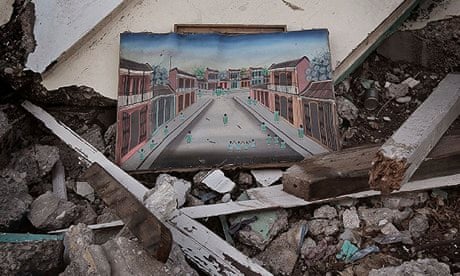
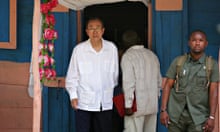

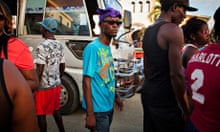
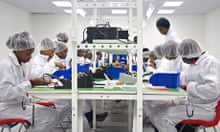
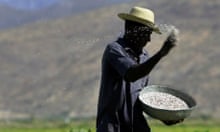
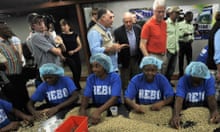
Comments (…)
Sign in or create your Guardian account to join the discussion